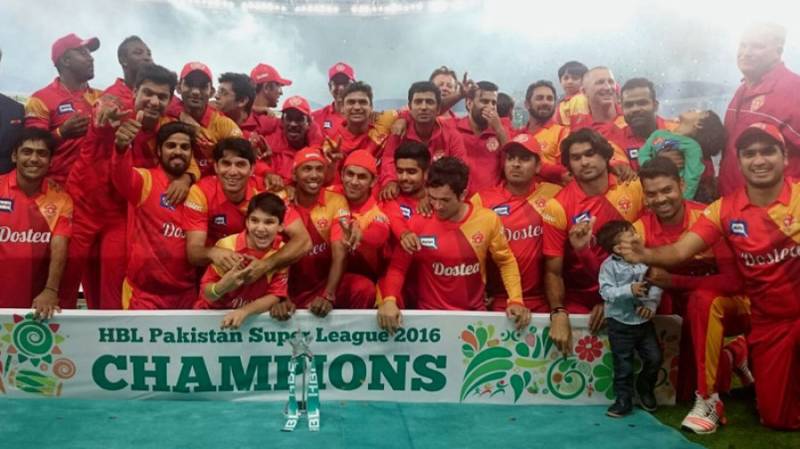The PCB is considering the prospect of adding another team to the Pakistan Super League with the possibility of the sixth team being named Kashmir, after the province of Azad Kashmir in Pakistan. The move looks unlikely, however, for different reasons: opposition from some of the current franchises on financial grounds and the potential for controversy given Kashmir's sensitive status vis-a-vis India.
The current structure of the PSL comprises five teams whose names are derived from provincial capitals - Lahore, Karachi, Islamabad, Quetta and Peshawar. According to a contract signed between the PCB and the franchises, the number of teams cannot be increased until the third edition.
Sethi had tweeted last month: "My dream is to launch 6th Kashmir team in PSL this year. Hope our five franchisee partners will support me in this initiative." Peshawar Zalmi team owner Javed Afridi supported Sethi's initiative but the other teams were not as enthused. Sethi said Kashmir, Faisalabad, Sialkot and Gilgit-Baltistan were in the fray for the potential team.
"We will not have [a new team] until the third year that is written," Sethi confirmed in an exclusive interview with ESPNcricinfo. "But at the same time we are looking at the financials about the addition of a sixth team, in terms of whether it will be Kashmir, Faisalabad, Sialkot or Gilgit-Baltistan or any other team. That decision is pending. We have to weigh up the pros and cons and that's the issue right now but we cannot have it until franchises agree. Without their consent we can't make it."
The opposition from the franchises is centered around the potential cut in their share from the central revenue pool. After the inaugural edition of the PSL, 70% of the revenue was split equally among the five franchises and the percentage would have been higher had the tournament been held in Pakistan instead of the UAE. Sethi said he was trying to convince teams that the addition of a sixth side would benefit them.
"Of course we have to offer guarantee to the teams that they will be better by having a sixth team and have to convince them. I have my team working on different values and estimated profits and revenues before pitching this idea to them but this idea is definitely under consideration. Basically the advice from our finance department is that this is the high time to add sixth team as the values are very high at this stage before the second edition. We have to cash in the hype we have created from the first edition and this may or may go down next year."
The PCB regulates the franchises and manages the day-to day-cash flow, bearing the cost of logistics and payment to foreign and local players to avoid any dispute. Sethi confirmed the spending cap of each franchise, currently placed at US$1.2m, has been increased by 10% for the second season.
In a recent PCB meeting, Sethi, who is also head of the central executive committee, made a bid to register PSL as an independent entity, primarily to cut down on hefty taxes paid by the Pakistan board and the franchises. Sethi took up the case with the finance ministry, but the negotiations fell through; the only concession was the overseas players getting a tax-free salary.
"The idea is to make it a non-profit, registering it as separate company, to allow PCB to re-invest the net profits into development of cricket," Sethi said. "Right now it is still in the pipeline and may not be an easy task. Although we sought seed money from the PCB budget for the first edition, we will have our own budgets from next year. We thought it will be a PCB-owned company but absolutely independent, and whatever money PSL makes it will go down into development which will be exempted from tax."
According to Sethi the first edition of the league generated $11.4million in revenue which is 30% higher in value than the estimated $8.02million. He admitted direct and operational expenditures had increased from $7.71million to $8.93million but PCB still manage to produce an estimated profit of $2.47million. The tournament operations were started with approximately $3-4m of seed money from the PCB's budget and more income was generated after selling the five teams for $9.3 million.
"We have beaten our own expectations and the asset value of each team has increased drastically," Sethi said. "Teams aren't really making profit right now from the market and they need time to make themselves a proper brand but their asset value has gone up significantly. If anyone of the team want to sell their team they can get hike of one million in their original price, which is a welcoming sign. They incurred some loses and we have covered it up from our own PCB's central pool and gave them $400,000 each apart from the 70% of our revenues from broadcaster, gate money, title sponsorship etc."
Sharing key figures from the financial report, Sethi said: "We sold franchises in $9.3million with the first year and revenue from other means was $2.11million for the first edition. We spent $1.22million extra from our estimated budget $7.71m; the expenditures were $4.71m in direct and $4.22m in operational cost which is mainly because of the high value of renting the stadium in UAE which cost us $3.27m (Dubai and Sharjah)."
The PCB is also mooting workshops to give franchises an understanding on how to leverage their business further and explore different revenue streams at a time when they are yet to break even. "Teams should be profitable by the third year," he said. "We have been insisting that merchandising is a key revenue stream for them. That is directly linked to the marketability of the franchise and so far Peshawar is the only team that has done fairly well in this regard. We also need them to step up and market themselves better."
Courtesy Cricinfo






